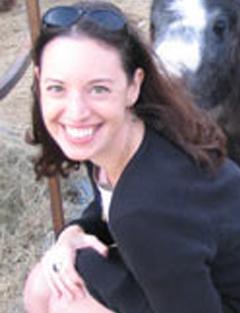Current Position:
I’m currently the U.S. Research and Campaigns Officer for FOUR PAWS, which is an international animal welfare organization. I conduct ongoing research into animal protection issues relating to the U.S and for our international campaigns, such as ending the practice of canned lion hunting in South Africa. I help develop and implement campaign strategies, plans, and tactics in order to deliver positive outcomes for animals both here in the U.S. and abroad.
What were you doing before entering the M.S. in Animals and Public Policy (MAPP) program?
I was a Rebate Business Analyst for Affiliated Computer Services (ACS) in Boston. I served as the primary liaison between local pharmacies and ACS headquarters and assisted in the management of drug rebates for the Massachusetts Medicaid program.
What aspects of MAPP led to your decision to join the program?
Animals have always played a crucial role in my life, which is why I was drawn to this unique program. Growing up with a holistic view of the world, I have always been interested in and aware of the vital link between an animal’s welfare and its environment and the impact that humans have on that connection. With an undergraduate degree in biology, I joined the program with the aim to gain both a better understanding of the role science plays in forming public policies affecting animals and to learn how to better address the fundamental and complicated relationship between animal welfare issues and environmental issues.
In what ways do you use your MAPP degree in your current position?
In order to receive my degree, I had to demonstrate excellent written and verbal communication skills along with a proficiency in understanding both qualitative and quantitative data. All of these skills are extremely useful in my current position.
Tell us about your MAPP project or preceptorship. In what ways did it help you form your career goals?
For my final project, I conducted a 2004 assessment of the exotic pet bird population in Massachusetts. With the continuing influx of surrendered birds to shelters and rescue organizations in MA, many organizations are concerned with both the animal welfare implications for the birds as well as the environmental issues associated with the continued harvest of exotic wild birds for the pet trade.
I’ve always been interested in wildlife and exotic animal issues. So when the MSPCA and parrot rescue groups were wanting to know more about the homeless bird situation in MA, I was thrilled to be able to carry out a research study that was really needed for information that had never been collected or documented before. Thus the research I gathered was something tangible for the organizations to use for addressing the growing homeless population of parrots and improving captive parrot welfare. Being able to do research and provide information that benefits animals and the groups that care for them is incredibly rewarding for me and is a big reason for why I continue to pursue this line of work.
What did you like most about the MAPP program?
I loved the small class size and the opportunity to work closely with and learn from so many experts in the animal field. My classmates are also some of the most amazing women I’ve ever met and I’m grateful for the experiences we shared and our friendships.
Is there anything else you would like to share with prospective MAPP students?
The animal field can be a mentally and emotionally challenging field to work in. So be sure to hold on to your sense of humor and don’t forget to spend some time with actual animals, such as volunteering at your local animal shelter or the Tufts Wildlife clinic.
MAPP Capstone Research Project: The Plight of the Parrot: An Exploratory Study on the Relinquished Parrot Population of Massachusetts
